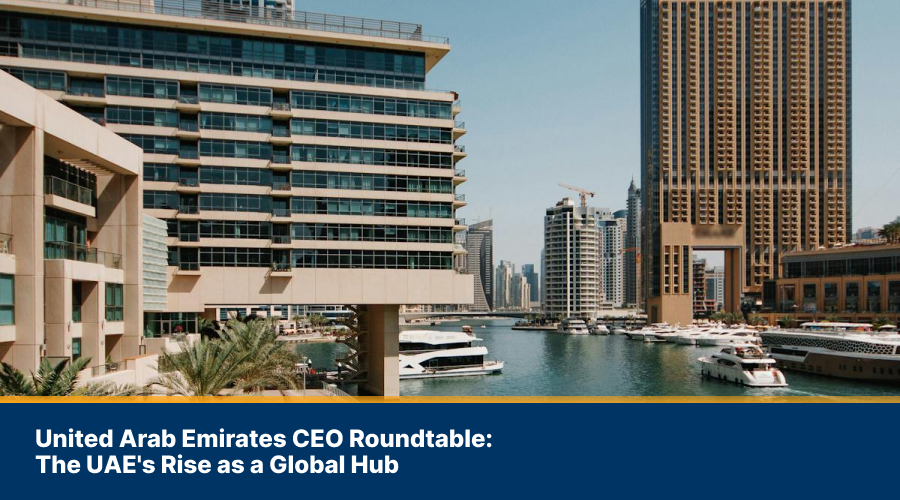United Arab Emirates CEO Roundtable: The UAE Emerging as a Global Hub
July, 2024
The CEO Roundtable focused on exploring the strategic shift of the United Arab Emirates (UAE) from a regional powerhouse to a global hub. The panel acknowledged the UAE’s enduring position as the preeminent regional hub for multinational corporations (MNCs) in the face of intensifying competition from other Gulf Cooperation Council (GCC) countries. The primary focus of the discussion revolved around the key drivers propelling the UAE’s global ambitions, with a particular emphasis on the evolving talent landscape of the UAE, and the corresponding implications of these developments.
The CEO Roundtable started on an upbeat note. Over the past two decades, the UAE has proven itself to be highly resilient, and this is especially true for Dubai. The panel believes that Dubai is well-positioned to adapt to the challenges, changes and shocks of a complex world.
Factors Fuelling UAE’s Global Ascendancy:
Compelling Talent Proposition: Dubai, the flagbearer of the UAE’s economic diversification, boasts a vibrant and cosmopolitan talent pool which draws on a diverse global diaspora that offers unparalleled access to international leadership and mid-senior talent. Moreover, the UAE offers an attractive standard of living coupled with a zero personal income tax regime, creating a compelling value proposition for attracting and retaining top talent.
Streamlined Business Environment: The UAE has established itself as a paragon of business ease. The government of the UAE has committed itself to nurturing a transparent and predictable regulatory landscape that is characterised by clear and concise policies, with the expectation that this will in turn foster investor confidence. Additionally, the UAE’s strong focus on a future-oriented vision positions it at the forefront of innovation and progress. Recent streamlining initiatives, such as the reduction of work permit and residency approval times from 30 days to only 5, further underscore the UAE’s commitment to operational efficiency.
Delivery on Promises: The government of the UAE can boast a well-deserved reputation for delivering on its ambitious development commitments. From infrastructure megaprojects to business simplification initiatives, the government has consistently demonstrated unwavering dedication to economic diversification and technological advancements. This firm commitment inspires confidence across diverse industries.
Collaborative Emirate Ecosystem: A noteworthy characteristic of the UAE’s ascent is the absence of cutthroat competition between its constituent Emirates. Instead, the Emirates have developed a symbiotic relationship of interconnection and mutual support, particularly between Dubai and Abu Dhabi. This collaborative, constructive approach, with each Emirate focusing on distinct areas of specialisation, strengthens the UAE’s collective value proposition as a global hub.
Investment Prowess: In addition to attracting substantial foreign direct investment (FDI), the UAE has emerged as a proactive investor itself. Sovereign wealth funds such as AIDA and ICD spearhead strategic investments in international markets, further solidifying the UAE’s position as a global player.
Emerging Challenges and Considerations: While the UAE presents an undeniably attractive proposition, it is not without its challenges. Addressing these challenges, particularly those of leadership talent acquisition and retention, will be paramount in ensuring the UAE’s continued success as a global hub.
Escalating Cost of Living: The rising cost of living in key UAE hubs such as Dubai and Abu Dhabi presents a significant challenge to leadership talent acquisition and retention. The UAE’s lack of personal income tax remains a significant advantage, but the increasing cost of living can erode its appeal to senior leadership and mid-management talent.
Leadership & Mid-Management Pay Disparity: The stark differential in compensation packages between leadership and mid-management levels compared to other established markets poses a significant challenge. This pay gap makes it difficult for organisations across various sectors to attract and retain highly qualified tier-two management talent.
To conclude, the CEO Roundtable was impressed with the way in which the United Arab Emirates has planned, executed and realised its ambitions, positioning itself as a streamlined collaborative environment. The main challenges involve leadership talent acquisition and retention, although these are largely related to compensation. Provided that the leadership talent issue can be resolved, the CEO Roundtable is optimistic about the UAE’s continuing growth as a global hub.

